
To listen to the Federal Newscast on your phone or mobile device, subscribe in PodcastOne or Apple Podcasts. The best listening experience on desktop can be found using Chrome, Firefox or Safari.
- Federal employees have taken over 121,000 hours of emergency paid leave in the first month since the program began thanks to the American Rescue Plan. The Office of Personnel Management is tracking how much leave employees are using. Congress approved a $570 million emergency paid leave program, and employees at the Department of Veterans Affairs and the Social Security Administration are the heaviest users so far. Employees are eligible to take emergency paid leave through the end of September, or until the leave funds are exhausted. Employees have exhausted roughly $4 million so far.
- The Biden administration is ordering the Transportation Security Administration to expand union rights and explore pay raises for airport screeners. Homeland Security Secretary Alejandro Mayorkas said TSOs deserve the same collective bargaining and appeal rights that most other federal employees have. He’s directing TSA leadership to revise bargaining policies and renegotiate a contract with the American Federation of Government Employees. TSA will also develop a plan for paying airport screeners General Schedule wages. Paying TSOs higher wages depends on Congress appropriating more funds for TSA. (Federal News Network)
- The Transportation Security Administration spent hundreds of millions more dollars than it expected to, because of bad planning on a major HR contract. The Homeland Security Department’s inspector general said it’s likely that TSA will need to add an unplanned contract for HR services because it vastly overspent its original estimates for the existing $290 million contract with Accenture. The inspector general said the reasons include TSA adding new requirements to the contract long after it was awarded. In all, the agency’s contract management decisions meant it spent $92 million more than it planned on the Accenture contract, and an extra $129 million on a separate HR contract that was supposed to have been retired five years ago.
- The Chief Data Officers Council is getting feedback from agency CDOs on how they’re handling their work. In a survey of 40 CDOs, more than a quarter said they report directly to the head of their agency. Another quarter report to their agency’s chief information officer. A majority of CDOs at CFO Act agencies said this job is their primary responsibility, but many CDOs at smaller agencies said they have other primary responsibilities. The majority of CDOs who took the survey said workforce hiring challenges, or limited staff skills are the top challenge for their work.
- The Justice Department is investigating campaign contributions made by Postmaster General Louis DeJoy during his time in the private sector as a logistics executive. An outside spokesman for DeJoy confirmed the investigation, first reported by the Washington Post, but said a USPS inspector general report found no concerns in DeJoy’s financial disclosures and divestments. The spokesman said DeJoy is cooperating with the Justice Department, and has fielded questions from Congress on the issue.
- The Postal Service saw an uptick on on-time mail delivery, but challenges remain. USPS reports delivering nearly 88% of first-class mail on time in May. That’s nearly a 10% increase in performance compared to how the agency ended the second quarter of fiscal 2021. Those metrics still fall short of on-time delivery rates for the agency in recent years. USPS in its annual report to Congress expects to end this fiscal year delivering 88% of two-day first-class mail on time. The agency expected it will deliver 69% three-day first class mail on-time for the same period.
- Lesbian, gay and bisexual troops are more likely to be sexually assaulted in the military. A new study from the RAND Corporation found that non-heterosexual people made up 12% of the active force, but 43% of the sexual assault victims in 2018. RAND said the Defense Department needs to do more to understand the dynamics of sexual assault and who is being victimized.
- The Defense Department is getting good marks for its handling of the coronavirus. The Pentagon kept its eye on the ball when it came to responding to the pandemic. A new report from the Government Accountability Office said the Defense Department kept sustained leadership attention on coronavirus by establishing a task force to oversee the response. DoD also used and disseminated useful data on the disease’s spread and is learning best practices from the last year. The Pentagon also established good protection measures and made safe decisions about lifting restrictions, the report said.
- The Securities and Exchange Commission will give $23 million to two whistleblowers whose assistance helped end a fraudulent scheme involving tens of millions of dollars. Since issuing its first award in 2020, the SEC has given more than $928 million to 166 whistleblowers. The payments are made out of an investor protection fund established by Congress and financed by monetary sanctions.
- A new White House memorandum establishes fighting corruption as a core national security interest for the Biden administration. In it, the president laid out his expectations for federal agencies when it comes to anti-corruption measures. It calls for an interagency review process to modernize tools agencies have to fight corruption, and to establish best practices and enforcement mechanisms.


Comments are closed.